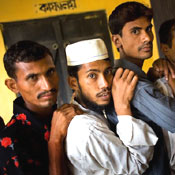
India’s political landscape has long been dominated by coalition politics. This happened because of the rise of regional parties, particularly in the country’s south, and later by the increasing influence of politics based on caste. Now, scores of political parties are contesting the elections and neither of the two national parties — Congress and the BJP — is expected to get more than one-third of the 543 seats in the Lok Sabha.
There are both pros and cons to this development. The emergence of numerous regional and caste parties has provided a voice to the people and ensured relative political stability. But there are growing concerns that the multiplication of parties is at the cost of a cogent national vision.
As India goes to the polls, what should voters prioritise? Diversity or unification? Broad representation or a national vision?



Coming from South India and living in New York,I would say issues matter most to us.Democracy is too deeply rooted and nothing can replace it.Even a 70 yr old illiterate lady would stand in line for a couple of hours and vote.In the beginning,it was the language issue which gave rise to regionalism (Hindi being imposed in Tamilnadu).Pakistan could not foresee what was coming on its horizon while imposing urdu on E.Pakistan. Now any issue is an issue.
So far all the regional parties played a positive role for any national issues, whether it’s Mumbai terror attack, Nuclear pact with US, health care, infrastructure development, etc. Elections when gives the voice to poorer section of society would help eradicate poverty and move the nation in right direction. I hope this also help to eradicate political corruption and increase the efficiency of the government.
India was ruled by a single party (Congress) in the first 25 years and despite of democratically elected governments,majority of its time used to be spent in bringing communal harmony between majority Hindus who somehow still blamed Muslims for partition of their motherland and the Muslims who rejected the two nation theory and decided to live in India. But in seventies the people of India got a new boast of national identity after Pakistan was divided to liberate Bangla Desh despite US and CHINA threatening to intervene.That period brought national reconciliation between Hindus and Muslims and they both changed their old stance of fighting on the name of religion. It happened when then prime Minister Mrs Indira Gandhi after assuming overwhelming powers arrested all prominent religious and political leaders. Thats the big mistake Indira did as she locked Mr Atal Bihari Bajpai and Imam Bukhari of Jamia-Masjid in Delhi.After Indira declared Elections and released all political prisoners the people of India was told that they never thought will ever hear again that Syed Bukhari telling Muslims that you are not a true muslim if you do not vote for Bhartiyai Jana sangh (original name of BJP), and Atal Behari Bajpai for the first time calling Muslims as brothers. At this juncture all parties lost their hold on religious block of voters. Muslims were no longer a guaranteed congress’s vote bank. Result is very clearly noted in the Indian political history. Congress lost the Election and for the first time a coalition government came into the center.Since then no single party has ever gotten an absolute mandate because the coalition governments can perform better in a democratic system because different factions in a coalition keep a close eye on others performance.It is not necessarily bad but in democracy good does better with bad and the nation will do good if the good keeps a tab on the bad.
Democracy works best when one votes for ones needs. This is how the poor massess drove off BJP and installed Congress in spite of the slogan of India shining. Poor people collectively weilded more power over who they want to be governed by. Actually no other country has shown this capability by the people of the lowest economic strata. I hope this time too it works as well.
Coalition parties with smaller regional parties are not a significant problem as yet.
The glory that comes with having a regional party leader become PM of India is quite substantial. It helps regional parties to develop a national perspective.
At the same time, bickering and posturing hurt the country for things that should be driven purely by national interest.
Vienna,27-04-2009
As an Indian, and human I think we need the
elections to root out lawlessness every where.
It may be at NOIDA,almost part of the Capital
New Delhi or Ahmedabad of the Sabarmati saint.This
elections are about rule of law and progress.
Besides, our pluralism should give us strength
at a crucial time that is approaching.
Power has several universal tendencies: to accrete, to consolidate, to corrupt.
The U.S. describes itself as a democracy by virtue of having two political parties whose candidates compete in elections. But this is merely a battle for top-dog status on the heap of power and wealth; both parties are rooted in the same plutocratic substrate, dominated by the super-rich elite, including conspiratorial, subversive, anti-democratic combines like AIPAC and “American Enterprise Institute”.
Indians should keep in mind that “a cogent national vision” is what the euphemistically self-styled “neocons” propagated for eight disastrous years through their puppet Dubya.
India was always a multi party democracy, even in 1977 and later in early 90’s we had coalition govts, In this scenario growth is slow, and many times important Bills do not get through, however we see it as check and balance, meaning absolute power is also wrong and India faced it in early 70’s when Indira Gandhi govt. had absolute power. There is a saying .. that Power makes you corrupt and absolute power makes you corrupt absolutely.